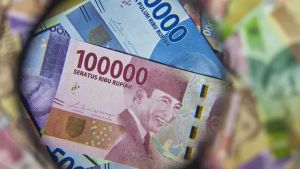JAKARTA - The Ministry of Finance (Kemenkeu) reported that the amount of government debt until March 31, 2024, reached IDR 8,262.1 trillion with a debt ratio of 38.79 percent to Gross Domestic Product (GDP).
"The outstanding position of government debt, the amount of government debt as of the end of March 2024 is IDR 8,262.10 trillion," quoted from the KITA State Budget Book issued by the Ministry of Finance, Tuesday, May 7.
The general policy of debt financing to optimize domestic financing sources and utilize foreign debt as a complement, the majority of government debt comes from within the country with a proportion of 71.52 percent and the rest comes from foreigners.
Meanwhile, based on the instrument, the composition of government debt is mostly in the form of SBN which reaches 88.05 percent and the remaining 11.9 percent of the loan.
Based on the instrument, the composition of government debt is mostly in the form of Government Securities (SBN) which reached IDR 7,274.95 trillion or 88.05 percent and loans of IDR 987.15 trillion or 11.95 percent.
In detail, the composition of SBN is divided into domestic SBN of IDR 5,947.95 trillion, 71.09 percent and foreign currency (foreign currency) of IDR 1,388.92 trillion or 16.97 percent.
The domestic SBN includes state debt securities amounting to Rp4,797.16 trillion and state sharia securities worth Rp1,1501.79 trillion.
Meanwhile, foreign exchange SBN is divided into state debt securities amounting to Rp1,044.37 trillion and state sharia securities worth Rp344.55 trillion.
Meanwhile, the amount of government debt in the form of loans amounted to Rp987.15 trillion consisting of domestic loans amounting to Rp35.51 trillion and foreign loans amounting to Rp951.64 trillion.
In detail, foreign loans include bilateral loans worth Rp264.73 trillion, multilateral value of Rp584.69 trillion, and commercial banks of Rp102.22 trillion.
SEE ALSO:
The efficient SBN market will increase the resilience of Indonesia's financial system against economic shocks and financial markets.
With debt financing activities through the issuance of SBN, the government encourages the development and deepening of domestic financial markets. SBN also provides references to determine the price of other financial market instruments and is used by market participants to manage interest rates risk.
Furthermore, in order to increase debt management efficiency in the long term, the government continues to strive to create a deep, active, liquid domestic SBN market.
One of the strategies is through the development of various SBN instruments, including the development of environmental-based thematic SBN (Green Sukuk) and SDGs (SDG Bond and Blue Bond).
In addition, the role of digital transformation in the process of issuing and selling SBN supported by online systems is no less important, able to make the procurement of debt through SBN more effective and efficient, and credible.
"The government manages debt carefully and measurably to achieve an optimal debt portfolio and supports the development of the domestic financial market," he wrote.
The English, Chinese, Japanese, Arabic, and French versions are automatically generated by the AI. So there may still be inaccuracies in translating, please always see Indonesian as our main language. (system supported by DigitalSiber.id)
















